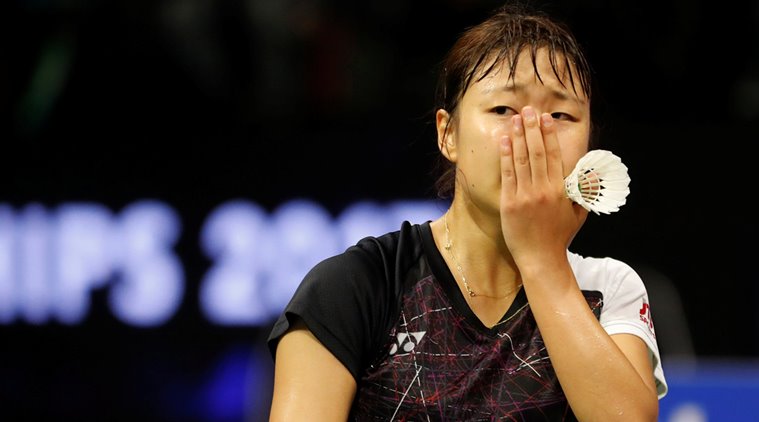Opinion Zen And The Art Of Winning
Japan is scouting sports talent young and ensuring they dominate the big stage
 Fantastically agile and blessed with anticipation, Okuhara moves fluidly on the court to pick every shuttle and has devised an overhead spring shot and what’s called in the south of India a ‘jhatka drop’. (Source: Reuters)
Fantastically agile and blessed with anticipation, Okuhara moves fluidly on the court to pick every shuttle and has devised an overhead spring shot and what’s called in the south of India a ‘jhatka drop’. (Source: Reuters)  Fantastically agile and blessed with anticipation, Okuhara moves fluidly on the court to pick every shuttle and has devised an overhead spring shot and what’s called in the south of India a ‘jhatka drop’. (Source: Reuters)
Fantastically agile and blessed with anticipation, Okuhara moves fluidly on the court to pick every shuttle and has devised an overhead spring shot and what’s called in the south of India a ‘jhatka drop’. (Source: Reuters)
There’s a surge of 22-year-olds from Japan who can’t wait for the 2020 Tokyo Olympic Games. India watched on Sunday as one of them showed her readiness to stake claim to the gold medal in three years. India witnessed the magnificence of Nozomi Okuhara because it has managed to get one sport right. And P.V. Sindhu dragged the nation’s gaze from whatever occupies it these days onto a very rare badminton World Championship final where with her fellow 22-year-old Sindhu scripted a classic. Okuhara, though, is just one amongst the Japanese champions across sports.
In Paris, where Indian grapplers drew a sensational blank, 22-year-old Kenichiro Fumita claimed the 59 kg Greco Roman gold at the World Wrestling Championships. Yui Sasaki, just 18, seamlessly slid into the 48 kg category where 23-year-old Eri Tosaka had won Japan the gold at Rio.
Japan, incidentally, was top-seeded in women’s singles at the Badminton Worlds with Akane Yamaguchi also in the mix, and hand to heart, if there’s one return that the badminton world is looking forward to it is of the men’s singles talent Kento Momota. Duly punished for a gambling transgression and forced to miss the last Olympics, Momota is ready to be unleashed on the world. In women’s doubles, within a year of Takahashi-Matsutumo shocking the Danes for the gold at Rio, Japan’s second pair Yuki Fukushima-Sayaka Hirota were in the finals though they went down to the Chinese.
These are traditional Japanese domains where they are expected to do well — whether its Rio or Tokyo, but the country’s sporting system has done something right to ensure some exceptional names were scouted out in the teens and learn to dominate on the big stage.
Okuhara, of course, owned the gold medal podium, but she also captured the imagination with her impressive body balance and temperament. There was a sense of zen in her game and how she carried herself for three successive matches against the toughest opponents on the circuit. She was ready with Plans D, C and B should the immaculate Plan A not play out as envisaged.
Both Okuhara and Sindhu wanted that title — Japan’s not been in the finals for 40 years, and India’s never won a World Championship gold. But there was a distinct absence of desperation in Okuhara’s campaign, and an assurance that ensured that in the final moments of the match, she stayed unruffled by all the pressure. Okuhara stood still between points, in control of the match, knowing exactly what was to be done.
Sindhu is an Olympic silver medallist and will be suitably battle-hardened by the time Tokyo comes, but one suspects she’ll sport a thoroughly changed personality from the high-strung, high-pitched battle in Rio with Carolina Marin, when she heads to Tokyo.
The scorching pace of rallies from Rio might well be passé by the time the Tokyo Olympics arrive, and not just because the contenders will be four years wearier, but also because of the emergence of players like Tai Tzu Ying and Okuhara who bring a balance to their games and refuse to turn badminton into a reductive slugfest of speed and power.
At the 2016 Olympic Asian qualifiers for shooting in February of that year, the Japanese — not a particularly prolific shooting nation — arrived with a couple of rapid fire pistol shooters who ultimately edged out India’s 2012 silver medallist Vijay Kumar for a quota. The Japanese coaches declared that they were returning with both the quotas even before the final started. And sure enough, the two shot aggressively enough in the time-pressure event and quietly left, pocketing the qualification from the arena. These were young shooters in a fresh game, unearthed through a system that was gearing for a home Olympic Games with meticulous precision.
Japan boasts a silver medal in the men’s 4×100 metres race from Rio, and its women’s hockey is leapfrogging over India. Not only is Japan aiming for a better medal count at their home games in 2020, they are hoping they’ve unearthed once-in-a-generation talents who will be remembered for their uniqueness as well as excellence in sport.
shivani.naik@expressindia.com




